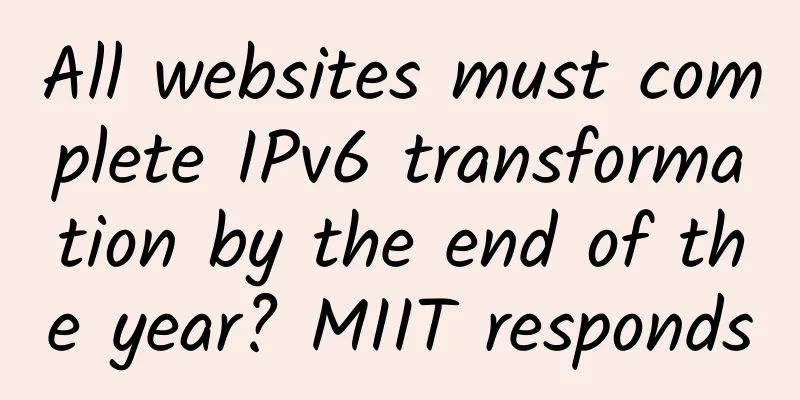From the war of phone bills to the war of traffic, the three major operators are launching a land grab movement again

|
Among all traditional industries in China, there are two industries where competition is unexpected for traditional enterprises. One is banking. After competing with each other, major banks found that their biggest competitors are third-party Internet financial platforms such as Alipay and WeChat Pay. The other is the telecommunications industry. After fighting for phone bills, the three major operators finally found that WeChat had taken the lead.
However, today, the revenue of the three major operators is beginning to change dramatically. The traditional model that used to be mainly based on voice and SMS revenue is quietly changing. According to the latest data from the Ministry of Industry and Information Technology, in the first half of this year, the proportion of mobile traffic data revenue in the telecommunications industry revenue in my country increased rapidly from 28% at the end of 2015 to 34%, surpassing mobile voice to become the largest business in the telecommunications industry. The industry has entered a development stage dominated by traffic, and the focus of the three major operators has also begun to shift from the war of telephone charges to the war of traffic. However, unlike the war of telephone charges, in the new round of traffic war, the three major operators have chosen to cooperate with Internet platforms. China Unicom launches two attacks simultaneously: both the enterprise and individual user markets are on the offensive Compared with China Mobile and China Telecom, China Unicom is relatively backward in the traffic war, but this also forces China Unicom to launch a more fierce offensive in this traffic war, and launch offensives on both the personal consumer and corporate ends. 1. Enterprise side: Cooperate with Lanxin to take the lead in firing the first gun In April this year, China Unicom and domestic mobile office platform Blue Letter jointly launched "Blue Letter Wo Card". Compared with China Mobile and China Telecom, China Unicom has taken the lead in firing the first gun for enterprise customer traffic with Blue Letter Wo Card. "Blue Letter Wo Card" is an exclusive 4G product sold only to corporate customers. The 20 yuan package includes 150 minutes of local calls to the city and the city, 200MB of intra-provincial traffic, and 6GB of intra-provincial directional traffic. In addition, "Blue Letter Wo Card" enterprise Unicom 4G users can also enjoy 1 yuan for 1,000 minutes of local calls/2 yuan for 1,500 minutes/4 yuan for 2,000 minutes of local calls. And Unicom's choice of Blue Letter to enter the enterprise traffic market can help them establish the following advantages. First, the demand for mobile office has been growing in recent years, and employees are reluctant to use their mobile data to work, which requires corporate customers to have a growing demand for mobile data, especially when processing some work documents, which requires a lot of mobile data. With the help of BlueMessage, China Unicom launched BlueMessage VoLTE, and also connected a large number of mobile office users that BlueMessage had accumulated before, including many large state-owned enterprises such as the Shanghai Stock Exchange, Xinhua News Agency, State Power, and Huadian. Secondly, for enterprises, traffic is important, but security is more important. One of the most important reasons why China Unicom chose to enter into a strategic cooperation with BlueMessage is BlueMessage's security advantage. As the only mobile office platform in China that has passed the national security level 3 certification, BlueMessage's security has been recognized by many large and medium-sized enterprises and even the entire industry, especially BlueMessage's exclusive deployment solution, which can be independently deployed within the enterprise's intranet, isolating the enterprise's core business from other non-core businesses and fully ensuring data security. Third, China Unicom entered the enterprise market with the help of BlueMessage, and another very important reason is BlueMessage's professionalism in enterprise services. While saving a lot of traffic costs for enterprises, BlueMessage VoLTE will also provide enterprises with more professional enterprise-level services with the help of BlueMessage's mobile office platform, thereby helping enterprises improve office efficiency. 2. Personal consumption: Cooperation with Alibaba and Tencent In the personal data consumption market, China Unicom has previously cooperated with WeChat to launch WeChat VoLTE, which has been widely welcomed by many users. However, WeChat cannot cover all the mobile Internet traffic of users. At the end of October this year, China Unicom joined hands with the entire Tencent Group to launch the "Tencent King Card", which costs only 19 yuan per month and all Tencent apps in the mobile phone, including WeChat, mobile QQ, Tencent Video, etc., are free of data, which has attracted the attention of many mobile phone users. At the end of November, China Unicom and Alipay announced a strategic partnership. The two parties will connect their user systems and jointly launch the mobile phone number brand "Ant Bao Card". They also launched the Dabao Card with a monthly fee of 36 yuan and the Xiaobao Card with a monthly fee of 6 yuan. The Dabao Card includes 2GB of domestic data and 100 minutes of domestic voice calls. The national data package outside the package is 10 yuan/GB, which is the most expensive data package on the market. With the help of the two giants, Alibaba and Tencent, China Unicom first gained their huge mobile user groups, some of which are China Mobile users and some are China Telecom users. Tencent covers almost 95% of the domestic mobile user groups through super portals such as WeChat and mobile QQ, and Alibaba also covers more users with mobile consumption capabilities through portals such as Alipay, mobile Taobao, and UC. Secondly, China Unicom's data card can obtain better marketing channels by leveraging Tencent's WeChat, mobile QQ and Ali's Alipay, which will become a marketing tool for China Unicom's data card. In particular, by leveraging the user data of giants such as Alibaba and Tencent, more accurate big data marketing can be achieved, which will greatly help China Unicom expand its market share. China Telecom seizes the opportunity and temporarily takes the lead in the personal consumption market Among the three major operators, China Telecom is the most aggressive in the traffic war, which also gives them a certain first-mover advantage in the battle for individual user traffic. As early as 2011, China Telecom began to work hard to gradually shift from voice traffic management to traffic management; and in 2014, China Telecom established a special telecommunications integrated platform to vigorously promote traffic management; in August this year, China Telecom began to transform and upgrade the new 3.0 strategy, focusing on "traffic + new ecology". Unlike China Unicom's in-depth strategic cooperation with Internet giants, China Telecom is fully open to cooperation through comprehensive platforms. Previously, China Telecom has begun to try traffic cooperation with many Internet platforms. For example, in 2013, Internet platforms such as UC Browser, AutoNavi Maps, and NetEase have reached cooperation with China Telecom, which has set off a storm of free traffic in the mobile Internet; during the 2014 World Cup, China Telecom mobile phone users can enjoy free traffic services throughout the World Cup by watching the World Cup through Sohu Video. Through cooperation and exploration with Internet platforms, China Telecom has also launched "Flow Treasure" for storing, buying, selling and transferring traffic, "Flow Coming" for free traffic public platform, and "Flow Control" for cheap and affordable targeted traffic distribution, etc., which have won them a certain reputation and users. Due to their early layout, they have already gathered certain advantages in this traffic war. However, it is not possible to say that China Telecom will be the winner of this traffic war. After all, in terms of overall mobile phone users, China Mobile has the most obvious advantage, while China Telecom is the weakest. China Mobile and China Unicom are also beginning to strengthen their layout in terms of traffic, especially China Unicom, which has been making frequent moves and has been very aggressive since the beginning of this year. In addition, China Telecom has not made any major moves in the enterprise traffic market. China Unicom has taken a step ahead with the help of BlueMessage. In the future mobile office era, enterprise traffic will become a very important component. China Telecom still needs to strengthen its layout in this regard. China Mobile is small but powerful Although China Mobile is not as aggressive as China Telecom and China Unicom in the traffic war, it has been working hard to achieve the transformation from voice-based operations to traffic-based operations since 2010, and has fully switched to 4G traffic operations by the end of 2013. Among the three major operators, China Mobile's comprehensive strength is undoubtedly the strongest. On the one hand, the number of China Mobile's 4G users has exceeded 500 million, far exceeding China Unicom and China Telecom, which has laid a solid foundation for China Mobile in the traffic war. For China Mobile, they only need to convert 500 million mobile phone users into their loyal mobile traffic users, and they will be able to achieve good results in this war. On the other hand, China Mobile's total traffic revenue currently ranks first among the three major operators. In the construction of the basic network for 4G mobile traffic, China Mobile's network coverage density and breadth are deeper and wider than those of China Unicom and China Telecom. In addition, China Mobile is also gradually strengthening its traffic cooperation with Internet companies. Since last year, China Mobile has reached a full-network traffic payment cooperation with Internet platforms such as 360 and Sina Weibo. According to the agreement with Qihoo, China Mobile will exempt mobile customers from all traffic fees for visiting 360 Mobile Assistant related sections and downloading apps in the special area. According to the framework agreement with Sina Weibo, China Mobile will launch free traffic products for its multiple businesses. Although WeChat has caused an unprecedented impact on China Mobile's voice and SMS business, China Mobile has still launched some cooperation with WeChat. Previously, China Mobile's major companies had cooperated with Tencent to launch WeChat traffic red envelope activities. In the era of traffic wars, it is becoming an inevitable trend for operators and Internet companies to move from confrontation to cooperation In fact, it is not just WeChat that has had a huge impact on the business of the three major telecom operators. Previously, many Internet phone platforms such as WeChat Phone Book and Youxin Phone have had a certain impact on the business of operators. But today, it is obvious that wireless wifi traffic cannot cover every corner, and mobile data traffic has naturally become the biggest demand of users for telecom operators. For the three major telecom operators, since the revenue from SMS and phone services is gradually declining, while the revenue from data traffic is constantly rising, there is no need for them to continue to compete with Internet companies. For Internet companies, launching more favorable data traffic cards can help them acquire more loyal mobile phone users; and for the three major operators, reaching cooperation with Internet companies can help them expand more channels and mobile network users, and increase data traffic revenue. As the proportion of traffic in the revenue of the three major operators continues to rise, the trend of cooperation between the three major operators and Internet platforms will become more and more obvious, especially China Unicom, which is currently lagging behind in the traffic war, is more urgently seeking cooperation with Internet platforms. From the total revenue of the three major telecom operators in China last year, in 2015, the three major telecom operators in China earned a total of 132 billion yuan, and China Mobile accounted for 82% of the total profit and ranked first with 108.5 billion yuan. However, from the year-on-year growth rate, China Telecom increased by nearly 10%, while China Unicom and China Mobile both declined. This is a huge pressure for China Unicom. It is not difficult to imagine why China Unicom's offensive this year is so swift and fierce. Using the Internet platform to grab more revenue and market share has become an important choice for China Unicom. Judging from China Unicom's overall layout in the traffic war, in the personal consumer market, China Unicom's current market share of traffic cards is not high. Relying on the two giants Alibaba and Tencent can bring some advantages to itself, but facing the competition from China Mobile and China Telecom, it is still hard to say whether China Unicom can carve out a path; in the consumer market for corporate customers, China Unicom has fired the first shot in the corporate user market with the help of Lanxin Wo Card. Along with the trend of mobile office, this will also become the key to China Unicom's victory in the traffic war with China Mobile and China Telecom. However, facing the repeated attacks of China Unicom, China Mobile and China Telecom will never sit idly by and will inevitably strengthen their cooperation with Internet platforms in terms of traffic. In the new era of traffic war, the cooperation between the three major telecom operators and Internet platforms will become more and more frequent, and the trend from confrontation between operators and Internet companies to cooperation will also become an inevitable trend. |
<<: Net loss of fixed-line broadband users: China Unicom sounds red alert
>>: Mobile Data and Broadband Outlook 2017: Consumers Expect More Inclusive Data Plans
Recommend
Five things you need to know about the current state of 5G
5G is a rare combination of national will and mar...
Friendhosting adds new VPS with large hard disk, 45% off for half a year, starting from 7.6 euros
Friendhosting sent an email titled "Storage ...
Siemens Industrial Network Experts Plan to Build a Digital Industrial Ecosystem, 5G+TSN Will "Weave" a New Industrial Communication Network
[51CTO.com original article] On July 16, Siemens ...
Let's talk about short links
Introduction I am working on a promotion system r...
Seven distributed global ID generation strategies, which one do you prefer?
[[415300]] After using microservices, many proble...
Five technical challenges in deploying IoT networks
Network architects and system engineers beware—ge...
5G is coming, but how fast?
Wireless networking is truly part of the culture ...
This year's 5G mobile phones must have these features!
[[387087]] This article is reprinted from the WeC...
RAKsmart San Jose high-defense servers start from $79/month, Japan/Korea servers start from $79/month
Yesterday we shared the RAKsmart New Year's b...
How to use SSL/TLS in Node.js
This article is reprinted from the WeChat public ...
Huawei introduces AI into the telecommunications industry to build an autonomous network that never fails
On April 18, 2018, at HAS2018, Huawei released th...
FCC votes to approve new round of 5G auction: once reserved for the US military
The Federal Communications Commission (FCC) voted...
2024 Cybersecurity Service Application Status Survey: Service Quality and Effectiveness Are the Biggest Application Challenges
As cybersecurity threats continue to evolve and e...
Network protocols TCP and UDP
First of all, I want to emphasize that the TCP/IP...
Wangsu Technology launches edge AI gateway to help developers build AI
On July 11, Wangsu Technology announced the launc...









